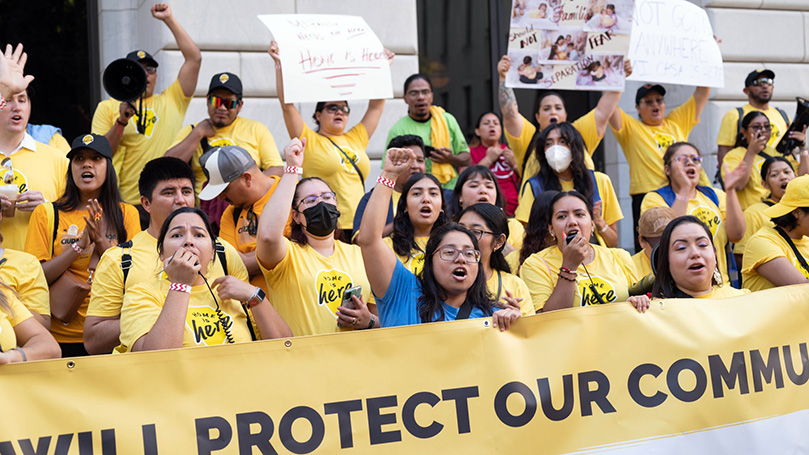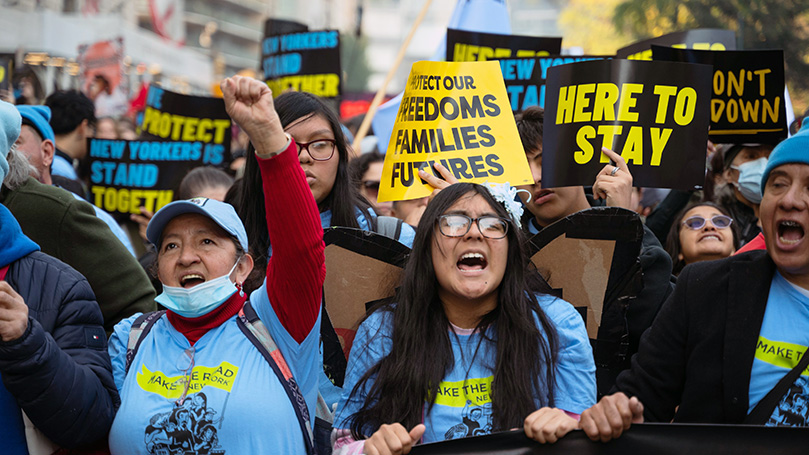
The following is an update on the next sixty days action plan presented by Joelle Fishman on behalf of the CPUSA Political Action Committee to the November 20 meeting of the CPUSA National Board.
Introduction
While the Senate and White House remain under Democratic Party control, we can work with allies to fight for priority bills and mobilize for big actions. For example, we can help build and participate with the Women’s March on Jan. 18 and the National Action Network march on Jan. 20.
We can also help organize mutual protection and fight for government protection against deportations and all that is coming, including attacks on public workers and social security. Today, it came out that the playbook is in place to defund Planned Parenthood.
Demands on Congress and the White House
Protect Nonprofits
Take action: Call your U.S. Senators now and say “Vote NO on Senate Bill 4136.” Senators should be flooded with phone calls, emails, texts to Vote “NO.” We have less than 50 days from now until inauguration to defeat S4136.
S4136 is the Senate companion bill to House bill HR 9495, a bill that endangers nonprofits and allows the Treasury Department to revoke status without due process. After initially failing a two-thirds required vote on Nov. 12, HR 9495 passed the House by a majority vote on Nov. 20, with 15 Democrats voting in favor. On the first vote, 50 Democrats had voted in favor. Due to public pressure organized by 300 organizations, 39 Democrats changed their vote.
As Rashida Tlaib pointed out, “This affirms that people have tremendous power to move their government representatives and reminds us how important it is to have elected officials who listen to their constituents. Let’s keep this in mind come mid-January when Republicans control the White House, the House of Representatives, and the Senate: People will still have power at the local, state, and federal levels. Transformative change comes when the people demand it, and we cannot stop fighting for the society we need and deserve, where we all have equal rights and freedoms and everyone’s needs are met.”
The following 15 Democrats voted yes: Colin Allred—Texas. Yadira D. Caraveo—Colorado. Ed Case—Hawaii. Henry Cuellar—Texas. Don Davis—North Carolina. Jared Golden—Maine. Vicente Gonzalez—Texas. Suzanne Marie Lee—Nevada. Jared Moskowitz—Florida. Jimmy Panetta—California. Marie Gluesenkamp Perez—Washington. Brad Schneider—Illinois. Tom Suozzi—New York. Norma Torres—California. Debbie Wasserman Schultz—Florida
Appoint Judges
Tell the Senate: Do Whatever It Takes to confirm the 47 judicial appointments pending before Trump takes office. The courts are already stacked with Trump appointees from his first term. This effort is being led by all the organizations and labor that mobilized for the elections.
Take Cuba off the Terrorist List
We have launched an urgent campaign of messages to the President to remove Cuba from the terrorist list which he had pledged to do. The sustainability and lives of the Cuban people are at stake.
ACTION: Call the White House weekly to say, “Take Cuba off terrorist list!” Contact President Joe Biden online, or call the White House switchboard at 202-456-1414 or the comments line at 202-456-1111 during business hours.
ACTION: Sign the Code Pink petition and the electronic letter initiated by DSA.
Rep. Barbara Lee and Jim McGovern initiated a letter in November to the President, signed by 18 members of Congress, urging Cuba be removed from the terror list. Seven members of the Massachusetts Congressional Delegation have also signed a letter to President Biden urging the same.
No weapons to Israel
ACTION: Call your Senators who voted yes to thank them, and ask them to call on Biden to take Cuba off terrorist list, to prioitize appointing judges, and to vote “NO” on Senate Bill 4136.
Many organizations mobilized in support of Bernie Sanders’ resolutions to end weapons appropriations for Israel. In a vote on Nov. 20, 19 Senators voted in favor, the largest that has come forward, including four Jewish Senators. Organizations that pushed for this included MoveOn, Indivisible, Win Without War, Jewish Voice for Peace, If Not Now, and many Palestinian organizations.
Prevent deportations
The ACLU is calling on Congress to cut funding to DHS immigration enforcement and to prevent Trump from having access to the resources he needs to carry out his mass deportation plans.
ACTION: Add your name to the message to Congress now.
Develop solidarity networks
We need to solidarity networks on all issues. Fighting against the deporation of migrants has a special importance in this political moment.
Defend Immigrant Communities! (A guide to action for clubs and Districts. Developed by the Immigrant Rights Subcommittee.)

[En Español.]
Immigrant communities across the country are facing the terrifying threat from the incoming
Trump administration of mass deportations and family separation. As immigrant families and
organizations come together to strategize, solidarity from the entire community is key. Here are
some ideas for an action plan, working with immigrant rights groups, that can be adjusted to the
situation and needs in your state or city:
- Collaborate with national organizations to boost local organizing. Reach out to small
businesses, labor unions, and faith communities locally to educate and join forces. - Work in coalition with immigrant-led groups to form Neighborhood Defense Committees.
- Include actions such as Rapid Response Networks with community allies responding to raids, stops, and other attempts to detain undocumented neighbors.
- Develop committees to provide legal assistance, Know Your Rights trainings, funds to bond out of immigration detention, accompaniment to court.
- Organize groups of lawyers to bring lawsuits against the unconstitutionality of the actions and defend birthright citizenship, enshrined in the 14th Amendment to the U.S. Constitution.
- Create sanctuary state legislation and strategize ways to evade Trump’s deportation orders and prohibit 287(g) agreements at the local and state level, which allow local and state police to cooperate with ICE.
- Pass sanctuary ordinances at the municipal level. (Los Angeles is an example.)
- Confirm state, county, and local authorities’ promises to not cooperate with enforcement of immigration laws, and to decline federal funding such as those coming from Operation Stonegarden. Hold meetings with local and state law enforcement entities to get confirmation and buy in — in writing, if possible.
- Educate the general public on who the immigrants in the U.S. are and what they contribute to the economy.
- Tell the immigrants that you know, undocumented and documented, that they are not alone.
Resources
- Protecting immigrant families: A coalition of over 700 organizations in more than 40 states, PIF includes immigrant rights and health care organizations, and organized labor. The American Federation of Teachers (AFT), National Education Association (NEA), Jobs with Justice, and SEIU are all member organizations.
In their statement released the day after the elections, Advocates Ready to Oppose Trump Attacks on Immigrant Families, PIF and its director, Adriana Cadena, promised to “oppose Trump’s reckless, radical, racist agenda. We challenge congressional Democrats to oppose legislation targeting immigrant families for exclusion from health and social services and commit to assertive oversight of executive actions targeting immigrant families.”
- United We Dream: Know Your Rights fact sheet
- Home Is Here coalition, a coalition of 100 organizations across the country.
- National Immigration Law Center: Know your rights fact sheet
- From the ACLU: Send this message to U.S. Representatives and Senators:
“These policies are inhumane – and one way Trump will aim to make them happen is by supercharging the Department of Homeland Security (DHS). That’s why we’re calling on Congress to cut funding to DHS immigration enforcement and prevent Trump from having access to the resources he needs to carry out his mass deportation plans. Join us by sending your message to Congress now.”
Image: Immigrant rights activists gather outside the New Orleans Fifth Circuit Court of Appeals in defense of DACA by United We Dream (X); People in NY march to defend immigrant communities by Make the Road NY (X)


 Join Now
Join Now